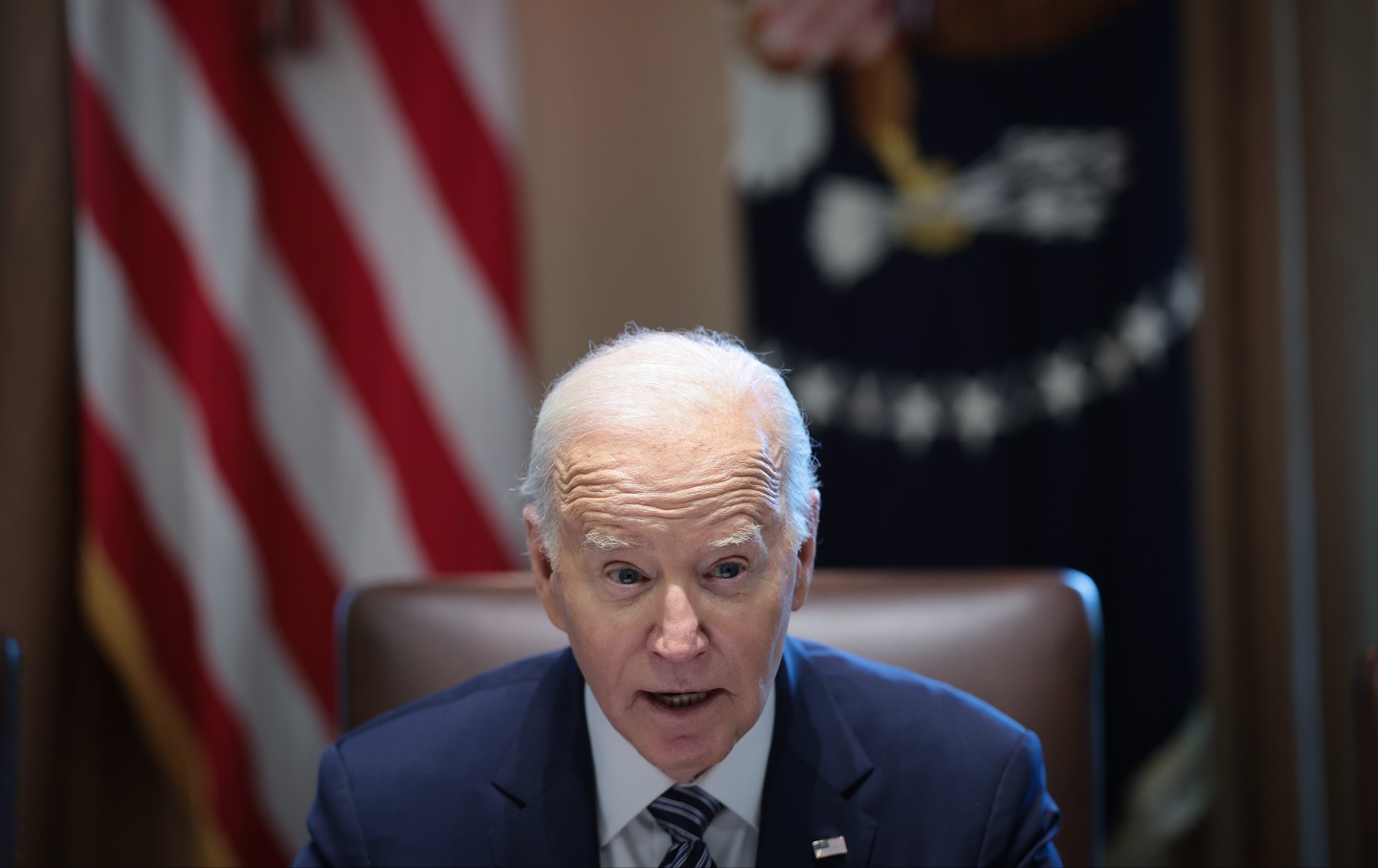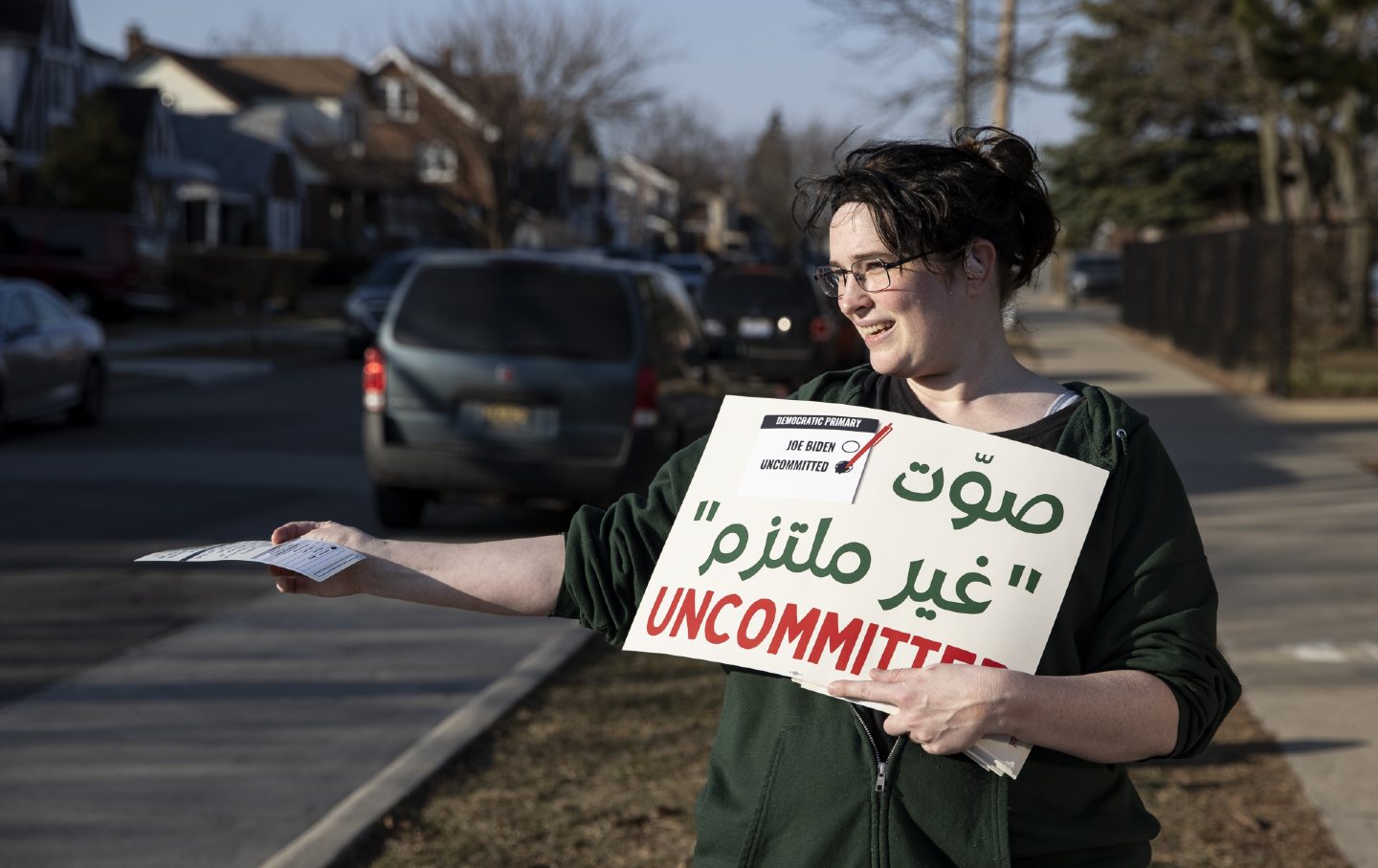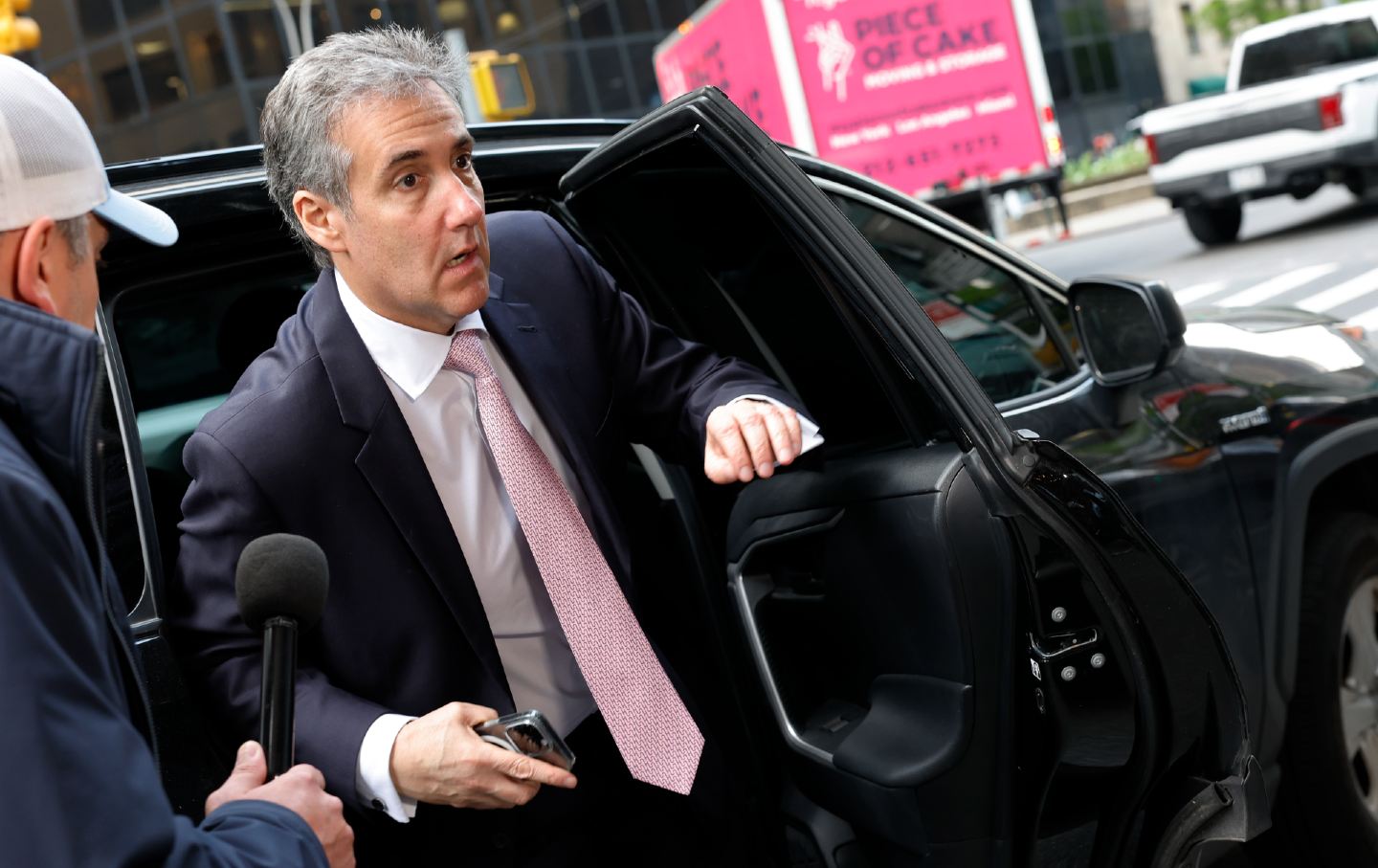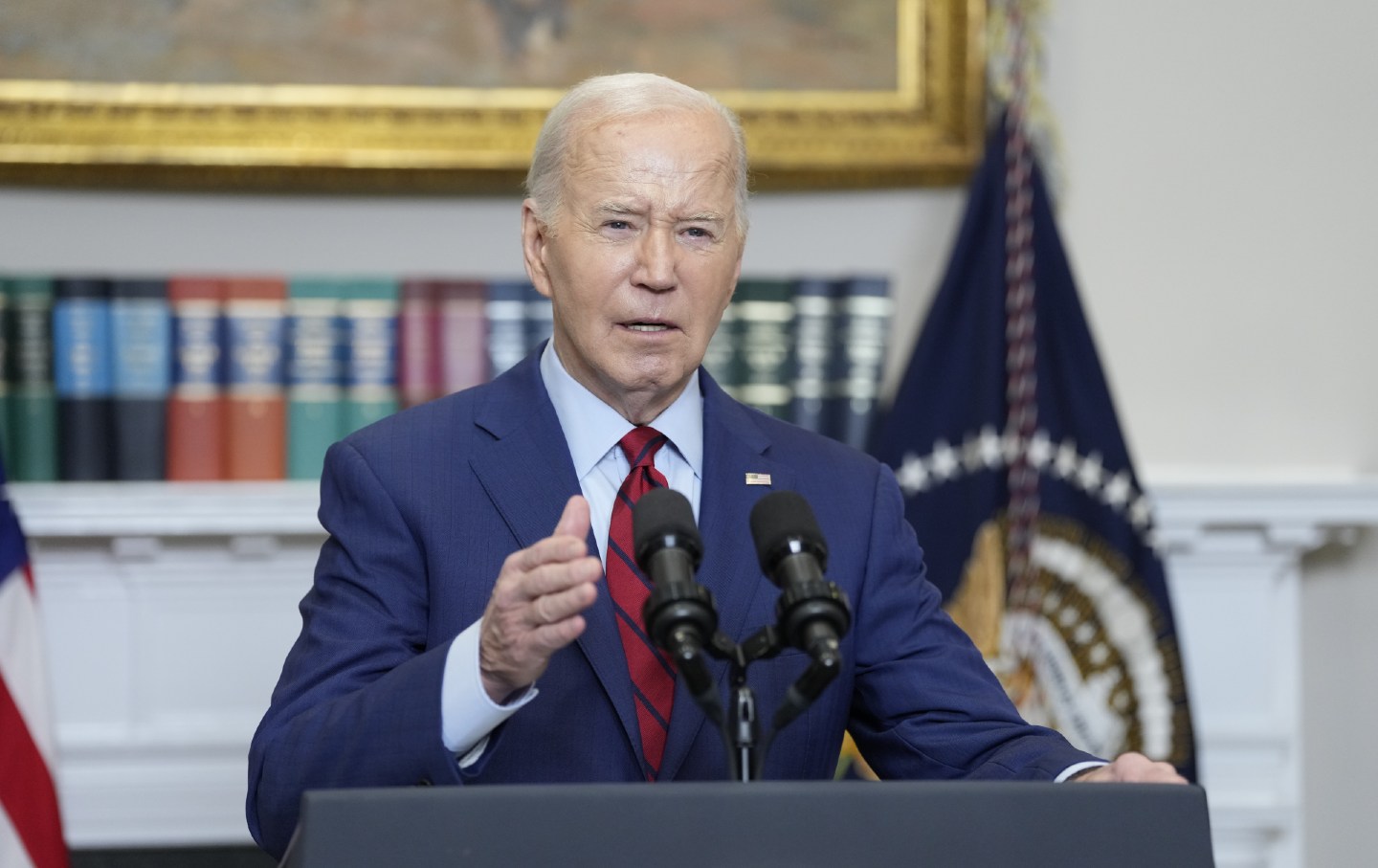Gaza Is on the Ballot All Over America
Inspired by Michigan’s unexpectedly high “uncommitted” vote, activists across the country are now mounting campaigns to send Biden a pro-cease-fire message.

A pro-Palestine protest in Seattle on November 24, 2003.
(Chin Hei Leung / Sipa USA via AP)Joe Biden did not directly acknowledge the fact that one out of every seven Michigan Democrats who cast ballots in that state’s February 27 presidential primary skipped over his name and voted “uncommitted” in response to a last-minute campaign to get the president to end US support for Israel’s assault on Gaza. But when Vice President Kamala Harris used the dramatic backdrop of Selma’s Edmund Pettus Bridge on Sunday to reiterate the Biden administration’s desire for a six-week cease-fire in the region—after Biden announced plans for limited airdrops of food supplies into Gaza—organizers of the Listen to Michigan movement that secured the unexpectedly high “uncommitted” vote announced, “Despite the naysayers in the establishment, the Biden administration is moving because of the pressure from uncommitted voters.”
That wasn’t a declaration of victory from the activists, who want a permanent cease-fire and an end to US military aid to Israel. But it was an argument that the movement to use primary ballots as a way to demand an end to the death and destruction in Gaza is having an impact—not just on politics but on policy.
The question now is whether more “uncommitted” votes cast in more primaries might infuse Biden and his team with the sense of moral urgency that has been lacking since the government of Israeli Prime Minister Benjamin Netanyahu responded to the October 7 Hamas attack on Israel with a full-scale military assault on Gaza that has killed upwards of 30,000 Palestinian civilians—more than 12,000 of them children. The answer will come from states across the country, where activists have picked up the “uncommitted” banner and are running with it.
More than two dozen states permit voters to cast “uncommitted,” “undeclared” or “no preference” ballots. In each case, if 15 percent of voters statewide, or in individual congressional districts, choose one of these options, they will send delegates with no obligation to back Biden to the Democratic National Convention in Chicago, where they could raise the issue of Gaza.
After months of marches, rallies, and protests, activists say there is now an electoral mechanism for raising the issue, and supporters of an immediate and permanent cease-fire are seizing it as a vehicle to “get a message to Biden” about his moral responsibility to stop the killing—and his political responsibility to listen to constituencies he’ll need to beat Donald Trump in November.
“Finally, we realized the most powerful tool we have in our grasp is the power to vote,” says Rami Al-Kabra, a Palestinian American city council member in the Seattle-area city of Bothell, who is working with Washington state’s “uncommitted” campaign ahead of its March 12 primary.
The Washington campaign gained traction last week, when the executive board of the state’s largest union, United Food and Commercial Workers Local 3000, called for an “uncommitted” vote, stating,
We need a nominee who can run and beat Trump to protect workers across this country and around the world.
We stand in solidarity with our partners in Michigan who sent a clear message in their primary that Biden must do more to address the humanitarian crisis in Gaza.
Biden must push for a lasting ceasefire and ending US funding toward this reckless war.”
In addition to Washington, “uncommitted” campaigns have emerged in several states, including Colorado, Minnesota, Massachusetts, North Carolina, Pennsylvania, Arizona, and Wisconsin. National groups, such as Our Revolution, Progressive Democrats of America, Democratic Socialists of America, and Jewish Voice for Peace Action, are backing the rapidly expanding national effort by more states to replicate the Michigan result.
The Michigan “uncommitted” vote—and its potential influence on the White House—gained significant attention from the media and from commentators on the right and the left. While congressional Republicans, such as US Representative Jim Banks (R-Ind.), griped after Biden announced the airdrops that the president was “basing his foreign policy on a Michigan election,” supporters of Palestinian rights took to social media with messages declaring, “Thank you, Dearborn. Thank you, Michigan primary.”
Dearborn, the city with the largest per capita Muslim population in the US, cast 56 percent of its votes for the “uncommitted” option on the Michigan ballot, while, statewide, the “uncommitted” campaign launched just three weeks before the primary won more than 100,000 votes and picked up two delegates to the DNC.
Biden still won, but the strength of Michigan’s “uncommitted” vote was widely noted even by Biden backers. “One hundred thousand uncommitted voters in Michigan shows the problem with Joe Biden’s current course in Gaza,” observed US Representative Mark Pocan (D-Wis.). “Time to wake up to the growing human rights concerns that many Americans have. And to recognize Netanyahu isn’t the ally some claim he is.”
Popular
“swipe left below to view more authors”Swipe →Asked on CNN if he thought that the Michigan vote was a warning sign for the White House, Senator Bernie Sanders I-Vermont, said, “I think it is. I think people all over this country are looking at what’s going on in Gaza and really cannot believe what they are seeing. It’s not only that 30,000 Palestinians have been killed, and 70,000 wounded—two-thirds of them women and children—but what we are looking at at this moment is the starvation of hundreds of thousands of children. And that is because of Israeli bombardments and that is because of restrictions at the border preventing humanitarian aid from getting in. This is absolutely unacceptable. In my view, and I have said this a million times, the United States should not be giving Netanyahu and his extreme rightwing government another nickel for their war efforts that are killing so many innocent Palestinians.”
It is the hope that Biden can be moved toward that level of clarity that has inspired activists across the country to borrow a page from Michigan and start campaigns like the one in Washington State, which just won the endorsement of Seattle alternative weekly newspaper The Stranger. While the paper’s editors—like many supporters of “uncommitted” campaigns—said they would back Biden over Trump in a November race, they explained, “Joining a movement to vote for uncommitted delegates to support a ceasefire gives us the rare opportunity to speak directly to the president on this issue, and the humanitarian disaster unfolding in Gaza is simply far too dire not to take advantage of that opportunity.”
Thank you for reading The Nation!
We hope you enjoyed the story you just read, just one of the many incisive, deeply reported articles we publish daily. Now more than ever, we need fearless journalism that moves the needle on important issues, uncovers malfeasance and corruption, and uplifts voices and perspectives that often go unheard in mainstream media.
Donate right now and help us hold the powerful accountable, shine a light on issues that would otherwise be swept under the rug, and build a more just and equitable future.
For nearly 160 years, The Nation has stood for truth, justice, and moral clarity. As a reader-supported publication, we are not beholden to the whims of advertisers or a corporate owner. But it does take financial resources to report on stories that may take weeks or months to investigate, thoroughly edit and fact-check articles, and get our stories to readers like you.
Donate today and stand with us for a better future. Thank you for being a supporter of independent journalism.
Thank you for your generosity.
More from The Nation

It’s Not Too Late for Democrats to Win Back Rural Voters It’s Not Too Late for Democrats to Win Back Rural Voters
Putting together a Democratic majority in 2024 requires winning back some portion of the rural working class. The good news is that it can be done. Here’s how.

Don’t Believe the Pundits: Gaza Is a Political Disaster for Biden Don’t Believe the Pundits: Gaza Is a Political Disaster for Biden
Some observers say the war isn’t that big a deal in the 2024 campaign. Here’s why they’re so wrong.

Angela Alsobrooks Beat the Big Money. Now She Has to Beat the Big Republican. Angela Alsobrooks Beat the Big Money. Now She Has to Beat the Big Republican.
Maryland’s new Democratic US Senate nominee won a bitterly contested primary. Now, she has an even tougher fight on her hands.

The Media Keeps Asking the Wrong Questions About Biden and the “Uncommitted” Vote The Media Keeps Asking the Wrong Questions About Biden and the “Uncommitted” Vote
Expecting voters to support the person with the power to stop the killing of their families, but who refuses to use it, is asking the impossible. This is about now, not November.

Michael Cohen’s Testimony Reveals the Sad Life of a Trump Toady Michael Cohen’s Testimony Reveals the Sad Life of a Trump Toady
Trump’s former lawyer described in court how the former president demands total sycophancy from his underlings.

Biden’s Domestic Reforms Don’t Add Up to the Great Society Biden’s Domestic Reforms Don’t Add Up to the Great Society
But they do signal that government can make life tangibly better.


